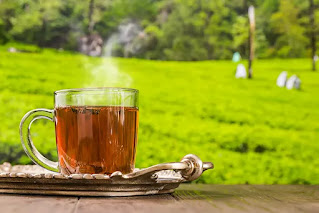Darjeeling tea is a tea made from Camellia sinensis var. sinensis that is grown and processed in Darjeeling district or Kalimpong district in West Bengal, India. Darjeeling Tea has the distinctive and naturally occurring organaoleptic characteristics of taste, aroma and mouth feel which have won the patronage and recognition of discerning consumers all over the world.
Tea plants were first planted in the Darjeeling region in the mid-1800s. At the time, the British were seeking an alternative supply of tea apart from China and attempted growing the plant in several candidate areas in India. Both the newly discovered assamica variety and the sinensis variety were planted, but the sloped drainage, cool winters, and cloud cover favoured var. sinensis.
The incomparable quality of Darjeeling Teas is the result of its locational climate, soil conditions, altitude and meticulous processing. The tea leaves are processed as black tea, though some estates have expanded their product offerings to include leaves suitable for making green, white, and oolong teas.
Image credit: theteashelf.com
The tea leaves are harvested by plucking the plant's top two leaves and the bud, from March to November, a time span that is divided into four flushes. The first flush consists of the first few leaves grown after the plant's winter dormancy and produce a light floral tea with a slight astringency; this flush is also suitable for producing a white tea.
Second flush leaves are harvested after the plant has been attacked by a leafhopper and the camellia tortrix so that the leaves create a tea with a distinctive muscatel aroma. The warm and wet weather of monsoon flush rapidly produces leaves that are less flavourful and are often used for blending. The autumn flush produces teas similar to, but more muted than, the second flush.
Darjeeling tea leaves are processed in the traditional “Orthodox” way. The inherently sensitive nature of finely plucked, green leaf responds best to gentle treatment. Although differing leaf varieties require intricate variations in processing, these stages undergone are uniform.
Once the leaf reaches the factory it is withered. The objective is to evaporate moisture from the leaf slowly. The leaf becomes limp so as to withstand twisting and rolling under pressure without crumbling. Liquor characteristics also begin to develop following physical and chemical changes within the leaf structure.
The experienced tea maker judges the extent of quality development from the fragrance progressively expressed by the leaf at regular intervals. This sensory judgement is critical to the quality of the infused liquor.
Once optimum fermentation has been achieved, the rolled leaf is taken for firing (or drying) to arrest further fermentation by deactivating the enzymes, and to remove fermented leaf. After final grading has been completed nomenclature are assigned according to the size of the grade.
These fall into three categories:
- Whole Leaf FTGOP – Fine Tippy Golden Flowery Orange Pekoe
- Brokens TGBOP – Tippy Golden Broken Orange Pekoe
- Fannings GOF – Golden Orange Fannings
The above gradations related only to the size of the leaf and not to quality differentiations. All grades are the product of the same green leaf. The smaller Broken and Fannings are generally used in tea bags. Recently new technology has resulted in tetrahydral tea bags which accept large grades as well.
The Darjeeling tea when brewed gives a colour of pale lemon to rich amber. The brew is said to have remarkable varying degrees of visual brightness, depth and body. The flavour emanating from the brew is a fragrance with a complex and pleasing taste and aftertaste with attributes of aroma, bouquet and point. The organoleptic characteristics of the Darjeeling tea brew are commonly referred to as mellow, smooth, round, delicate, mature, sweet, lively, dry and brisk.
GI Tag Registration Date : 29 October 2004
GI Tag Number : 1 & 2
Certificate Number : 1
Geographical Area : West Bengal
Special Cover Release Date : 08 March 2022
Cancellation : Kolkata 700 001
Type : GI Tag Cover
Cover Identification Number : WB/04/2022
Enlarged View of Illustration
Enlarged View of Cancellation
Back Side Scan






No comments:
Post a Comment